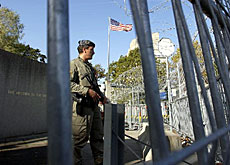Iraqis in Switzerland oppose war

Most Iraqis in Switzerland say they would like to see Saddam Hussein overthrown but are against a foreign invasion of Iraq.
Many fear that the Iraqi leader would sacrifice his own people if attacked by the United States. They are also suspicious of Washington’s motives for toppling Saddam.
“Saddam is really a very dangerous man, so of course he will use chemical and biological weapons… He does not care about human life or innocent people,” said Mr T, an Iraqi intellectual in Lausanne, who asked not to be identified for his family’s safety.
“I would like to see a peaceful resolution,” he told swissinfo. “But I don’t think it will happen.”
His comments reflect a general attitude among Iraqis in Switzerland, who would like to see Saddam removed from power but not at any cost.
“I think the Iraqi people want to get rid of Saddam and his regime… But if this war is to destroy our people and our country then we’d rather do without it,” said Mr H, a representative of the Arab-Swiss Cultural Centre in Zurich, who also asked to remain anonymous.
His feelings are shared by Samir, a Baghdad-born, Swiss-raised filmmaker, whose latest film is entitled “Forget Baghdad”.
“I’m very afraid that the American military will create a catastrophe,” he said, “because if a dictator – a sick, Hitler-type of man – is put up against the wall, he will try to harm his own people.
“If I had to choose between keeping Saddam or watching him hurt Iraqis because of war, I would prefer to keep the dictator, because history has shown that dictators always fall,” he added.
National sovereignty
Sukar Al Gazally, the head of the Iraqi Society in Switzerland, agrees that a war “would have catastrophic consequences on Iraq”.
“The Iraqi people don’t want war… they want peace,” he said. “They don’t want Saddam but they don’t want the Americans either.”
Many Iraqis in Switzerland, like Samir, believe that the US and its allies have no right to attack their homeland.
He is adamant that change should come from within Iraq and that the international community should throw its weight behind the country’s opposition movement.
“Of course, I can’t imagine that Saddam will go away on his own, but I don’t understand why the world doesn’t support the Iraqi opposition, which has been fighting for decades to topple this dictatorship,” said Samir.
“I have heard from a lot of members of the opposition who say that the American government is not even in contact with them.”
Imperialist agenda
According to Samir, the showdown over Iraq is creating a new world order “made up of imperialist powers that disregard the sovereignty of other nations”.
“The United States is flouting international humanitarian law… in a way that is very paternalistic and superior in regard to the Third World,” he said.
“Instead of giving the opposition time and helping them gain force, the Americans only believe in their own power… which consists of bombing the hell out of countries.”
Samir is not alone in questioning the US government’s intentions. Al Gazally believes political and economic issues lie at the heart of President George W Bush’s campaign to wage war on Saddam.
“The Americans have no feelings,” said Al Gazally. “They don’t know anything about the Iraqi people, their interests or their situation.
“The big question is whether they really want to liberate Iraq or whether they want their oil and the power.”
Anti-Americanism
According to Mr T, many Iraqis inside the country also distrust the US and do not welcome the arrival of American forces.
He cites the 1991 uprising by Shi’a Muslims as an example of how America failed the Iraqi people during the first Gulf War.
“The opposition had control over many provinces inside Iraq but then the Americans failed to intervene and allowed Saddam to use his helicopters and quash the rebellion,” he said.
In fact, Samir believes this specific incident helped to fuel the rise in Islamic fundamentalism, which has fanned the flames of terrorism over the past decade.
“This event fostered distrust of the West and it also created a group of Islamic fundamentalists who told their people: ‘You have seen that the West will never help us, so why do you believe them? Believe in Allah and we will win.’
“This kind of religious fanaticism never existed before in Iraq and it was fuelled by the bad politics of the West, and especially America, at the time.”
Foregone conclusion
Regardless of how they believe the current crisis should be resolved, most Iraqis in Switzerland tend to agree that Saddam can only be removed by force and that it is merely a question of time before the United States launches an attack.
“I am worried, like all Iraqis here in Switzerland, inside Iraq and around the world, about what is coming next,” added Mr T.
“We cannot support war, but I imagine that it will be the last solution for this crisis… because we know the President of Iraq.”
Mr T believes the US would eventually defeat Saddam, whom he hopes to see replaced by a democratically elected president; others are not so optimistic.
According to Samir, the different combat techniques of the American and Iraqi military forces are likely to result in the loss of many civilian lives, as well as a great deal of destruction.
“As we know, the Americans will not fight from house to house… They will destroy whole cities… and on the other hand, the Iraqi forces will be standing in front of their own graves trying to hurt everyone they can.”
“It will be a disaster and that’s why I’m against this war,” he added.
swissinfo, Anna Nelson in Geneva
Prominent figures from Switzerland’s Iraqi community say they would rather see Saddam stay in power than face a war in Iraq.
They fear Saddam will sacrifice his own people if confronted by the US.
According to aid agencies, as many as 500,000 Iraqis could need medical assistance if war breaks out.
The UN estimates that up to three million Iraqis could be hit by food shortages, while a possible 900,000 refugees might try to flee the country.

In compliance with the JTI standards
More: SWI swissinfo.ch certified by the Journalism Trust Initiative


You can find an overview of ongoing debates with our journalists here. Please join us!
If you want to start a conversation about a topic raised in this article or want to report factual errors, email us at english@swissinfo.ch.